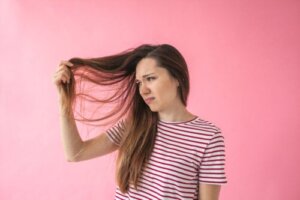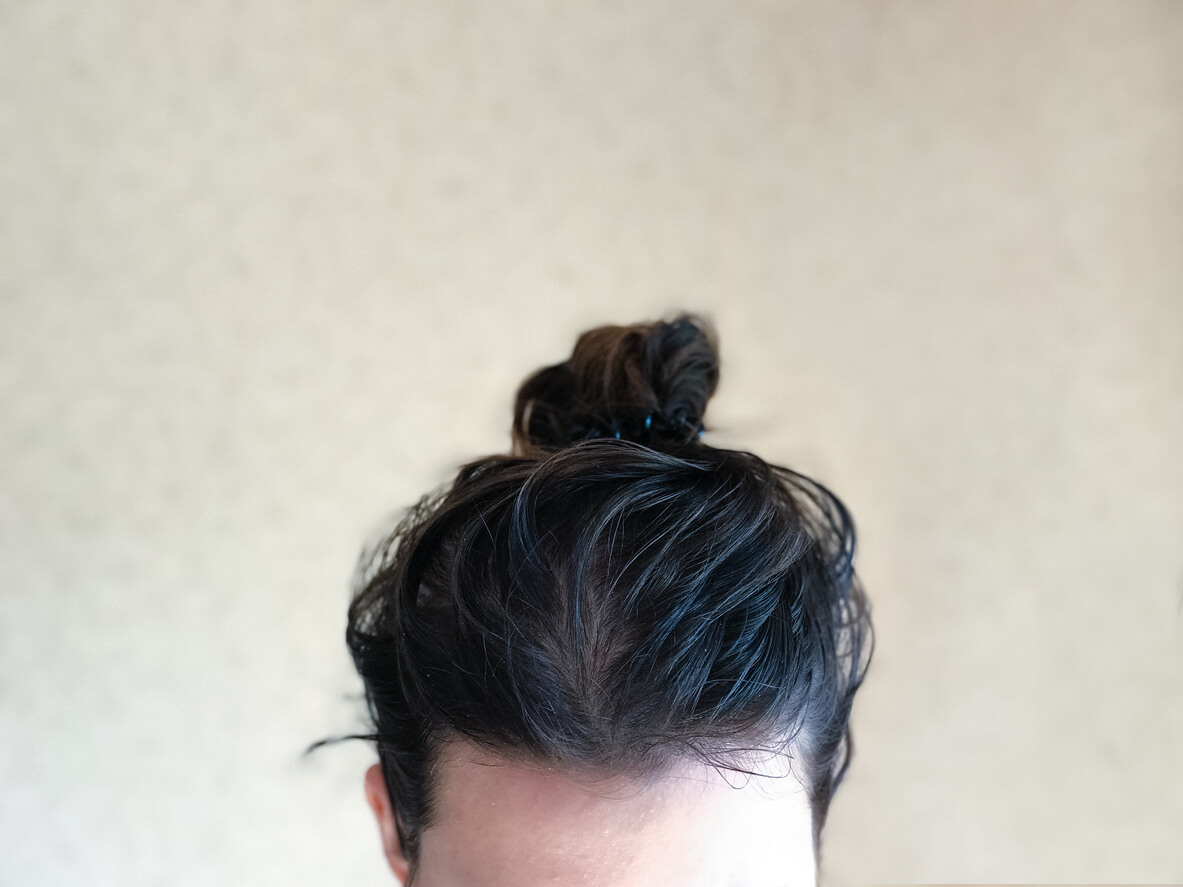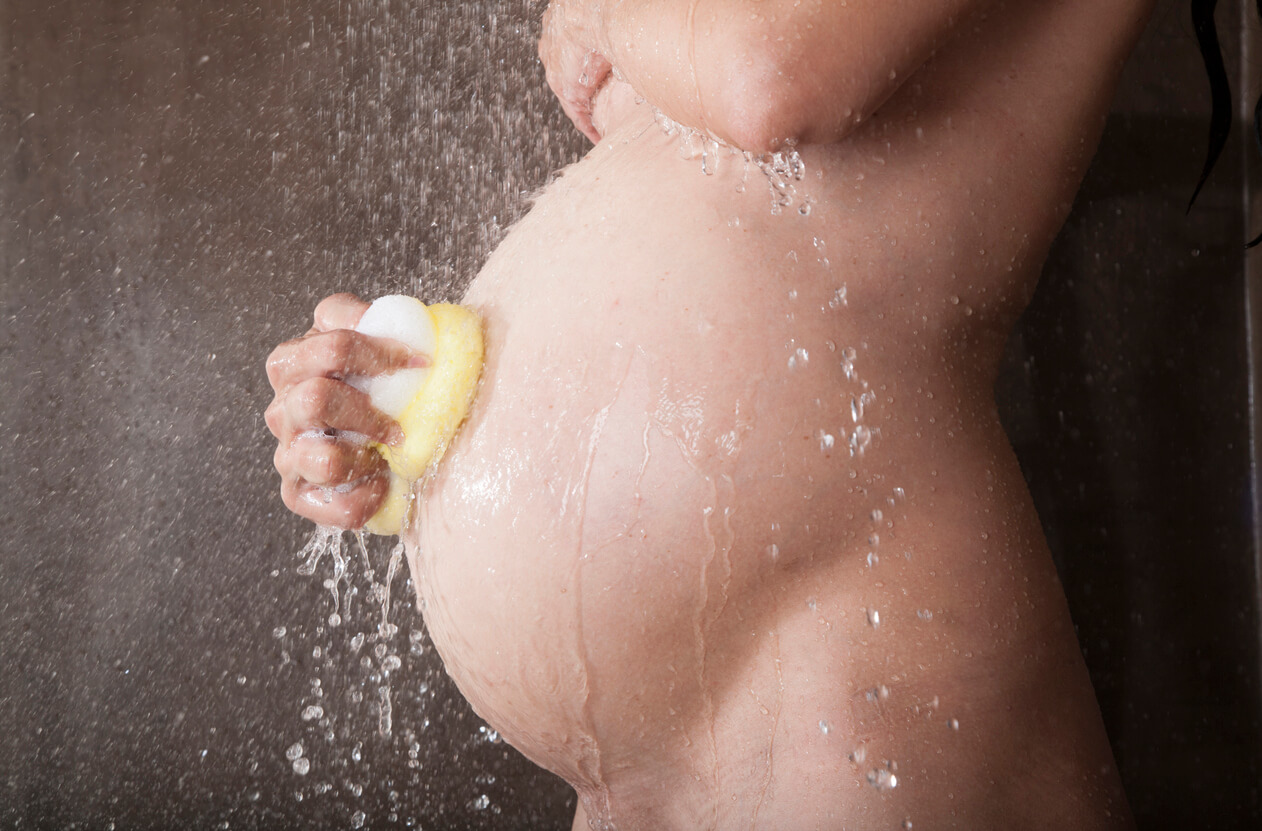Oily Hair During Pregnancy: Why and What to Do?

Oily hair during pregnancy is one of the physiological processes that occur when women are carrying a baby. In fact, about 90% of women will manifest changes in their hair, nails, and skin.
Here’s how to prevent it and have healthy hair. Are you interested?
Causes of oily hair during pregnancy
During pregnancy, the increase in placental hormones causes alterations in women’s hair. Therefore, the secretion of sebum in the scalp increases and this affects the appearance of the hair.
The sebaceous glands produce oil that protects the surface of the skin, but when they’re inflamed, they tend to cause skin alterations. Therefore, if the scalp glands become inflamed, not only will the hair be greasy, but there will be mild flaking, crusting, dandruff, and irritation.
Some of the other changes seen in the hair in the third trimester include the following:
- Increased hair thickness: It’s common for hair to show increased thickness during pregnancy. The hair shaft may even have an increased diameter. These changes give it a more vigorous and healthy appearance.
- An increase in the amount of hair: Hair growth, such as hirsutism and hypertrichosis, resolves on its own after delivery. These changes are caused by increased levels of androgens and estrogens during the last trimesters of pregnancy.

You may be interested in: Oily Skin During Pregnancy: Advice and Care
How to deal with oily hair during pregnancy
When pregnant women notice that their hair is greasier, there are some recommendations that can help and reduce this condition, according to the American Academy of Dermatology Association:
- Try to increase the frequency of washing and choose a shampoo that’s mild and has a neutral pH so that it doesn’t generate irritation on the scalp. Liquid hair soap helps to remove excess sebum, as well as the remains of cosmetic products and dirt.
- It’s best to wash hair with lukewarm water and perform gentle, circular massages on the scalp. This will stimulate circulation and blood flow in the area. Try to avoid using fingernails or creating unnecessary friction on the locks, as aggressive washing can irritate the scalp and cause more oil to be generated.
- The use of hair straighteners and blow dryers isn’t advised, as they can irritate and hurt the sensitive scalp. In fact, it’s best to dry the hair gently with a towel or let it air dry so that it adopts a natural texture.
- Using nourishing masks several times a week keeps hair strong and less likely to break.
- Use hair conditioner properly, i.e. put it only on the ends of the hair and rinse well so that it doesn’t look greasy afterward.
- Taking care of your diet and choosing foods that are not ultra-processed or sausages helps to maintain a good state of health. Hydration and the intake of fruits and vegetables are very important during pregnancy.
Natural oils protect the hair and are relevant for a healthy scalp and luminous hair. In addition, you should be very careful with cosmetic products used during pregnancy, as some may be contraindicated or may irritate and alter the skin. Therefore, always consult a dermatologist before using them.
Greasy hair and itching during pregnancy
A very greasy scalp can cause annoying itching and seborrheic dermatitis. Dandruff is often the reason for oily and itchy hair. These are some of the most common causes of itchy scalp:
- Allergic reactions to certain chemicals found in hair products or other external triggers, such as sensitivity to light.
- Outbreaks of dermatological diseases such as psoriasis or eczema.
Probiotics are believed to be a good way to reduce inflammation throughout the body, which can also help control dandruff and eczema flare-ups.
At the same time, shampoos with silicones can build up in the hair and provide a greasy, dirty, and heavy appearance. In fact, the most common ones found in hair include the following:
- Dimethicone
- Amodimethicon
- Cyclomethicone
In addition, it’s important to rinse and remove all traces of shampoo and conditioner from the hair. This can be one of the causes of an itchy scalp.

Oily hair during pregnancy is usually a temporary condition
Most hair disorders resolve in the postpartum stage, so they don’t require any symptomatic treatment and can be prevented with proper hygiene and care measures.
However, when hair continues to be greasy during pregnancy, despite the above-mentioned advice, and even presents flaking or itching, it’s best to consult a dermatologist for proper treatment.
Oily hair during pregnancy is one of the physiological processes that occur when women are carrying a baby. In fact, about 90% of women will manifest changes in their hair, nails, and skin.
Here’s how to prevent it and have healthy hair. Are you interested?
Causes of oily hair during pregnancy
During pregnancy, the increase in placental hormones causes alterations in women’s hair. Therefore, the secretion of sebum in the scalp increases and this affects the appearance of the hair.
The sebaceous glands produce oil that protects the surface of the skin, but when they’re inflamed, they tend to cause skin alterations. Therefore, if the scalp glands become inflamed, not only will the hair be greasy, but there will be mild flaking, crusting, dandruff, and irritation.
Some of the other changes seen in the hair in the third trimester include the following:
- Increased hair thickness: It’s common for hair to show increased thickness during pregnancy. The hair shaft may even have an increased diameter. These changes give it a more vigorous and healthy appearance.
- An increase in the amount of hair: Hair growth, such as hirsutism and hypertrichosis, resolves on its own after delivery. These changes are caused by increased levels of androgens and estrogens during the last trimesters of pregnancy.

You may be interested in: Oily Skin During Pregnancy: Advice and Care
How to deal with oily hair during pregnancy
When pregnant women notice that their hair is greasier, there are some recommendations that can help and reduce this condition, according to the American Academy of Dermatology Association:
- Try to increase the frequency of washing and choose a shampoo that’s mild and has a neutral pH so that it doesn’t generate irritation on the scalp. Liquid hair soap helps to remove excess sebum, as well as the remains of cosmetic products and dirt.
- It’s best to wash hair with lukewarm water and perform gentle, circular massages on the scalp. This will stimulate circulation and blood flow in the area. Try to avoid using fingernails or creating unnecessary friction on the locks, as aggressive washing can irritate the scalp and cause more oil to be generated.
- The use of hair straighteners and blow dryers isn’t advised, as they can irritate and hurt the sensitive scalp. In fact, it’s best to dry the hair gently with a towel or let it air dry so that it adopts a natural texture.
- Using nourishing masks several times a week keeps hair strong and less likely to break.
- Use hair conditioner properly, i.e. put it only on the ends of the hair and rinse well so that it doesn’t look greasy afterward.
- Taking care of your diet and choosing foods that are not ultra-processed or sausages helps to maintain a good state of health. Hydration and the intake of fruits and vegetables are very important during pregnancy.
Natural oils protect the hair and are relevant for a healthy scalp and luminous hair. In addition, you should be very careful with cosmetic products used during pregnancy, as some may be contraindicated or may irritate and alter the skin. Therefore, always consult a dermatologist before using them.
Greasy hair and itching during pregnancy
A very greasy scalp can cause annoying itching and seborrheic dermatitis. Dandruff is often the reason for oily and itchy hair. These are some of the most common causes of itchy scalp:
- Allergic reactions to certain chemicals found in hair products or other external triggers, such as sensitivity to light.
- Outbreaks of dermatological diseases such as psoriasis or eczema.
Probiotics are believed to be a good way to reduce inflammation throughout the body, which can also help control dandruff and eczema flare-ups.
At the same time, shampoos with silicones can build up in the hair and provide a greasy, dirty, and heavy appearance. In fact, the most common ones found in hair include the following:
- Dimethicone
- Amodimethicon
- Cyclomethicone
In addition, it’s important to rinse and remove all traces of shampoo and conditioner from the hair. This can be one of the causes of an itchy scalp.

Oily hair during pregnancy is usually a temporary condition
Most hair disorders resolve in the postpartum stage, so they don’t require any symptomatic treatment and can be prevented with proper hygiene and care measures.
However, when hair continues to be greasy during pregnancy, despite the above-mentioned advice, and even presents flaking or itching, it’s best to consult a dermatologist for proper treatment.
All cited sources were thoroughly reviewed by our team to ensure their quality, reliability, currency, and validity. The bibliography of this article was considered reliable and of academic or scientific accuracy.
- Gizlenti S, Ekmekci TR. The changes in the hair cycle during gestation and the post-partum period. J Eur Acad Dermatol Venereol. 2014 Jul;28(7):878-81. doi: 10.1111/jdv.12188. Epub 2013 May 20. PMID: 23682615.
- Kim SO, Ah YM, Yu YM, Choi KH, Shin WG, Lee JY. Effects of probiotics for the treatment of atopic dermatitis: a meta-analysis of randomized controlled trials. Ann Allergy Asthma Immunol. 2014 Aug;113(2):217-26. doi: 10.1016/j.anai.2014.05.021. Epub 2014 Jun 20. PMID: 24954372.
- Tips for healthy hair. [Internet] Disponible en: https://www.aad.org/public/everyday-care/hair-scalp-care/hair/healthy-hair-tips
This text is provided for informational purposes only and does not replace consultation with a professional. If in doubt, consult your specialist.








